
17. 100th Anniversary of
the Treaty of Versailles
28 June 2019
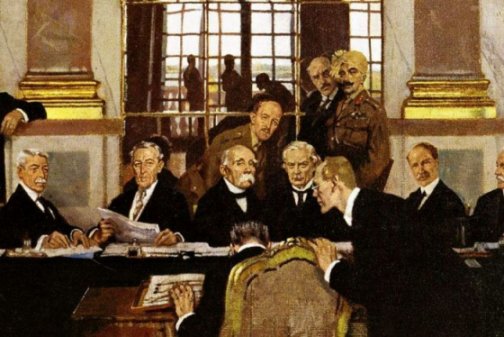
A Treaty of Infamy
Only one thing was worse than the catastrophic First War that was to begin the baptism in blood that was the 20th century and that was the infamous Treaty of Versailles. This dishonourable Treaty was signed 100 years ago to the day, under duress, and exactly 5 years after a Serbian terrorist called Gavrilo Princip murdered the heir to the Austrian throne, the Archduke Ferdinand in Sarajevo which lit the fuse, igniting the worldwide conflagration. By a strange twist of fate, this dishonourable Treaty was signed 35 years to the day before I was born, which is a reason I come to be involved in writing this article. What was so dreadful about this event? Isn't a Peace Treaty good news? Doesn't a Peace Treaty fulfill the Christian call for men and women of good will to be peace-makers in the world? No, the Treaty of Versailles was unlike any so-called 'Peace Treaty'. I will tell you why there is nothing for us to celebrate or be grateful for, and particularly for me, an Englishman, whose grandfather fought in Mesopotamia in that conflict, and whose nation were supposedly victorious. In reality, everybody lost and no abiding peace was secured because:
- 1. The Treaty guaranteed another World War with even higher causualty rates that led to the disasterous rise and spread of Bolshevism and Fascism that have cursed our planet ever since with a whole string of genocides;
- 2. The Treaty signalled the beginning of the end of Christian Civilization in Europe which in our day is almost complete;
- 3. The Treaty led, ultimately, to the destruction of one of the noblest Christian nations in history - the Kingdom of Prussia; and
- 4. The Treaty led to the enslavement and gradual ethnic cleansing not only of the German people but of all Europeans, not to mention Asians and Africans caught up in the lie of Communism and related left-wing ideologies. Upwards of 100 million people have perished thanks to this 'Peace' Treaty.
A Treaty Unlike Other Treaties
As such, then, it makes most other historical treaties between nations pale into virtual insignificance. The Treaty of Versailles was an ugly blot on Chtristendom, its architects guilty of a crime that has not since been matched. That is my thesis, I make no apology for it, and I hope now to now explain why I hold such a radical and politically incorrect view.
The Shaky Agreement
At 11 am on 11 November 1918 an armistice came into effect on the western front between Germany and the Allied Powers of Great Britain, France, Italy and the USA. By early May 1919, after six months of haggling amongst themselves, the four Allied Powers finally reached a shaky agreement as to what terms they should present to the German delegation, who had arrived in Paris, in order to bring the war to an end. They were in a hurry to get the Germans to sign as quickly as possible for three very important reasons:
- 1. The Allies weren't sure how long they would be able to maintain unity amongst themselves;
- 2. The Allies weren't sure whether the Bolshevik Revolution that had swept its way to power in 1917 and resulted in a terrible Civil War in that country would succeed or not in Germany and other nations as it had done in Russia and appeared to succeed in Hungary (it failed there). It had almost succeeded in Bavaria where a Soviet Communist Republic was established in April 1919 before being overthrown by elements of the Army and Freikorps; and
- 3. The Allies weren't sure how much longer they could maintain a large military presence for the purpose of resuming the war should Germany not agree to their terms as they were in the process of demobilising their armies and sending them home. Originally possessing 198 divisions between them at the time of the Armistice, their strength was down by 80 per cent, to a mere 39 divisions. Their nations were in any case war-weary and one of them, France, had experienced widespread mutiny.
The Situation in the East
Though Germany had made peace with Russia in 1917 with the Treaty of Brest Litovsk, they contined to maintain a large military presence in Eastern Europe after the Armistice - from the Ukraine to Estonia in spite of the chaos caused by the Russian Civil War that had spilled over into their militarily-controlled areas. Additionally, Poland had risen up in rebellion and had even seized control in the Prussian Province of Posen. As Germany pulled out of these occupation areas after 28 June 1919, so new combattants arose to take their place, principally the newly independent Poles and Bolshevik Russians, leading to a conflict that lasted until March of 1920 with a Polish victory against a Red Army determined to sweep through the whole of Europe and topple more than the Russian and Hungarian régimes:
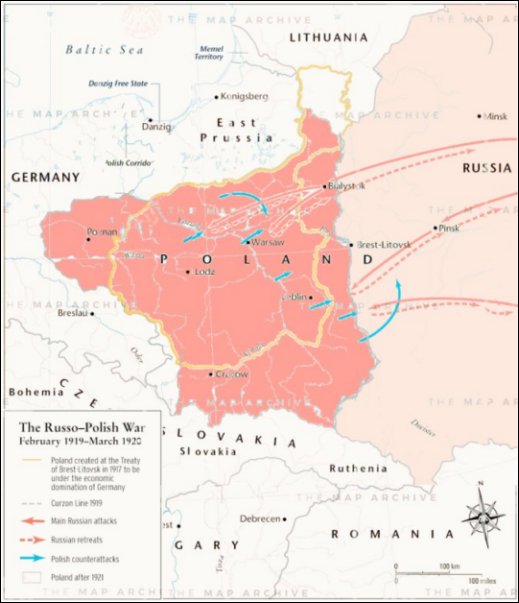
The Uprising in Posen
By February 1919, Poles were in control of the majority of the German Posen territory minus Bromberg which had a German majority (subsequently awarded to Poland), the western portion (left to Germany after Versailles) and some of the territory west of the Prosna River around Kempen and Schildberg.
The Polish Corridor Problem
So Germany was still fighting in the East, in spite of the Brest-Litovsk Treaty, and having to cope both with Bolshevik/Communist uprisings on her own territory as well as with the 'Greater Poland Uprising' that began on 27 December 1918 in Posen, sparked off by a revolutionary speech given by the famous Polish pianist and Prime Minister of the time, Ignacy Paderewski. The timing was certainly good as far as the Poles were concerned because internal conflict had weakened Germany, with soldiers and sailors engaged in numerous mutinous actions against the monarchy and the officer corps. Additionally the new German government was demoralised by the Armistice and was distracted in putting down the revolution at home. It was also advantageous for the Poles for another reason: their success in taking control of a large part of the Posen territory emboldened the Four Allied Powers in Paris to go ahead and include in the Treaty larger areas of Germany which they figured would consequently be easier to wrest away from a reluctant population. Accordingly, by the stroke of a pen, they detatched West Prussia (Westpreußen) too, giving Poland a 'corridor' to the sea (as US President Wilson had unwisely promised them, even though they were a landlocked nation), thus dividing Germany into two parts, the 'mainland' in the west and East Prussia (Ostpreußen) with its captal Königsberg in the east like a severed limb. Once Poland was in military and political control of the 'Corridor', it implaccably opposed all German proposals throughout the 1920's and 1930's for plebiscites, population transfers, highway projects and customs union reform.
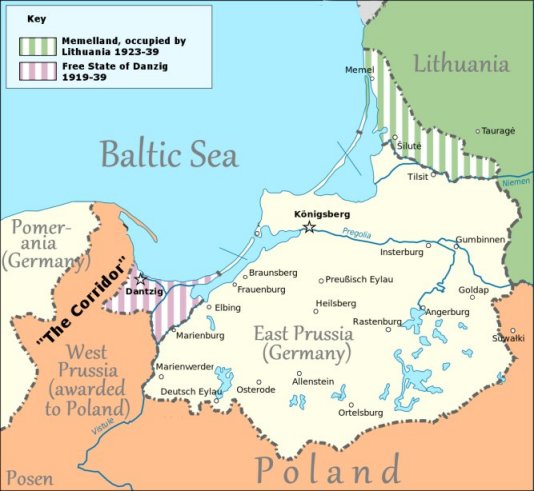
The Silesian Débâcle
Having been successful in Posen, the Poles attempted a similar revolution in Upper Silesia (Oberschlesien) between 1919 and 1921. And though a plebiscite there, in spite of Polish terrorism under the leadership of a man called Korfanty influenced the vote away from Germany, 60 per cent of the territory nevertheless voted for Germany which, as the Italian Commission pointed out, ought to have been restored as a whole to the Reich immediately. It wasn't, with the richest coal-producing area, along with its German-majority capital city, Kattowitz, being forcibly transferred to Poland in an unjust partition. This is the subject of another study.
The Tragedy of Posen
Though there was a clear Polish mjority supporting the Polish uprising in the central and eastern parts of the Prussian Posen territory, this was not the case in the north, west or south of that Province. On 15 December 1918 the Polish government in Warsaw broke off diplomatic relations with Germany as the uprising spread throughout the Posen area. Incursions into West Prussia and the Netze territory were repulsed thanks to a German offensive in the area of Bromberg and Nakel on 28 January 1919. With a ceasefire between Germans and Poles taking effect on 18 February 1919, lines of separation between Poland and Germany became more or less fixed until the Treaty of Versailles modified them once again. The great shame of it was that the line of separation between Poland and Germany in the Posen area at this time was more-or-less a clean ethnic one and would have made a just international border. The Polonificiation of Polish place and street names in the Polish-controlled part of the Posen (Poznan) territory was swift, with Polish becoming the official language on 15 May 1919.
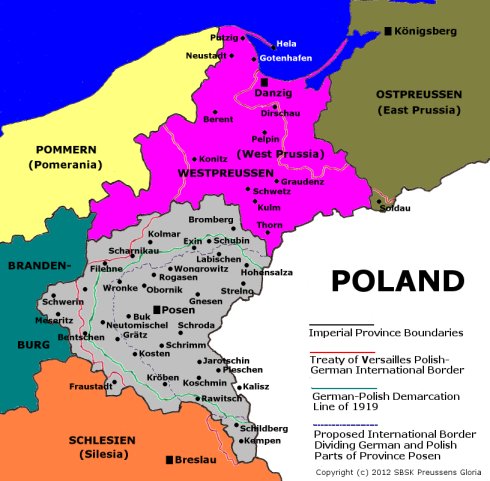
Disagreement Amongst the Allies
Let us return to the scene in Paris. It should be pointed out that after the Armistice on 11 November 1918, Germany was never asked to sit down with the Allied Powers to negociate as had been the civilised custom for centuries between a victorious and vanquished power. Instead, the terms were unilaterally dictated. The Allies were already resolved in their own minds to blame and punish Germany for the World War by extracting a very large economic indemnity and by preventing the nation from ever fielding an army for war again. The problem was the Allies could not agree how to achieve these goals because they each had different priorities:
- 1. The French wanted securtity, to continue the alliance with the Americans and British, be compensated for war losses, and to make Germany as weak as possible - they also wanted a buffer state between themselves and Germany carved out of German Rhineland territory, something they had tried to do 40 years earlier that had led to the disasterous Franco-Prussian War which they lost and were still smarting from;
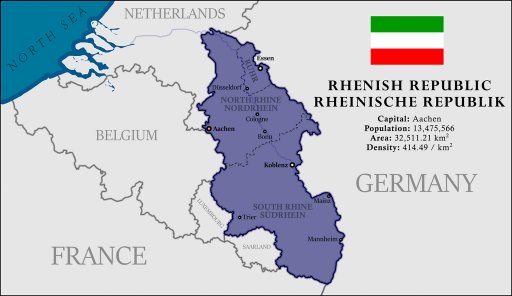 The French tried to create a Rhine Republic but were opposed by their allies
The French tried to create a Rhine Republic but were opposed by their allies
- 2. The British wanted to maintain the strength of their Empire, didn't want Germany as a rival or competitor but wanted to retain it as a viable economic market for British goods; they also wanted to maintain a balance of power in Europe, but didn't want Germany so weak it couldn't resist the Bolsheviks or for France to get too strong and so become a threat to its Imperial interests; and finally
- 3. The USA, believing free trade to be a cornerstone of a stable peace, wanted Germany to recover economically, but wanted the newly founded League of Nations to assume the security rôle for France up to now performed by the Allied military Alliance whilst assuring Germany remained militarily weak.
Brockdorff-Rantzau Arrives in Paris
Germany, in good faith, agreed to the Armistice on the basis of the assurances made them that the peace would be grounded on President Wilson's idealistic 14 points (which included the right of self-determination of peoples) and the diplomatic notes they had exchanged with the Americans in the autumn of 1918. Still on that basis, the 180-man German delegation journeyed by train to Paris led by Foreign Minister Graf von Brockdorff-Rantzau, who had served the Kaiser during the war but who also maintained good relations with the ruling Social Democratic Party. His goal, quite naturally, was to get the best possible terms for Germany whilst maintaining Germany's potential for Great Power status. He also expected, quite naturally, that the Allies would conduct diplomactic negociations in the finest European tradition. Back in 1815, when the rôles were reversed and Napoleonic France was the loser at the hands of the Anglo-Prussian Alliance, the French had been treated courteously and generously and were even allowed to retain the German-populated territory of Alsace-Lorraine. But on the very day that Brockdorff-Rantzau and the other delegates arrived in Paris he was aghast to not only learn that everything had been decided by the Allies beforehand while the Germans were still on the train to France, but upon arrival he had the terms for the peace settlement unceremoniously and contemptuously thrust into his hands as a permanently finished document. Not only this, but in a deliberate act of humiliation, the German delegates were put into the same hôtel in which the Prussians stayed after the French defeat in the Franco-Prussian War of 1871. There the German delegation was effectively kept under house arrest! On the same day French Premier Clemenceau gave the delegation a very short speech, falsely accusing Germany of starting the war, and informed them that there would be no verbal negociations whatsoever. The only response the Germans were permitted to give would be in writing only. The total absence of traditional face-to-face discussion is very important to remember because it had the effect of dehumanising the whole proceedings.
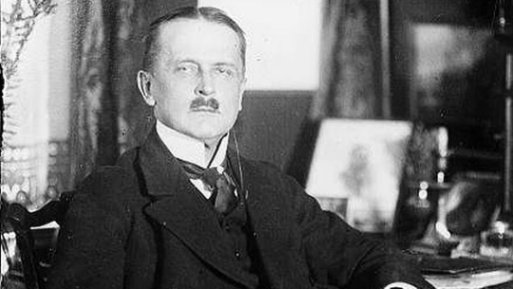 Count Ulrich von Brockdorff-Rantzau, German Foreign Minister and
Count Ulrich von Brockdorff-Rantzau, German Foreign Minister and
German Chief Negociator at the Paris Peace Talks
Brockdorff-Rantzau's Two Responses
Brockdorff-Rantzau's response was perfectly understandable. It would have been mine too were I in his shoes. He had brought two different speeches along with him - a soft and reconciling one in anticipation of cordial discussions, and another harsher and more defiant one in anticipation of a less friendly reception. He had decided that he would give one of the two depending on the situation. You get no points for guessing which version he was forced to choose. The substance of his response was:
- 1. An admission of Germany's military defeat;
- 2. A denial for Germany's responsibility for the war (which was a Serbian-Austrian affair with Russian involvement); and
- 3. A demand that the peace be based on Wilson's 14 points and the diplomatic notes which, as a man of honour and integrity, he felt were a binding agreement between gentlemen.
Funeral of the Old European Order of Christian Decency
What he hadn't counted on was that the word of a gentleman had ceased to apply in Allied morality. The old order of Christian decency was either gone or rapidly vanishing from sight. And this, as we shall see, was one of the worst consequences of the First World War that has in turn led to the social and political mess we find ourselves in today. Brockdorff-Rantzau soberly reminded the Allies that they were still maintaining their naval blockade of his country with disasterous consequences for the civillian population and noted:
"...the hundreds of thousands of non-combatants who have died since the armistice of November 11th, murdered as the result of cold calculation after our opponents had achieved victory. Think of that when you speak of guilt and atonement" (Jörn Leonhard, Der überforderte Frieden Versailles und die Welt 1918-1923, p.964).
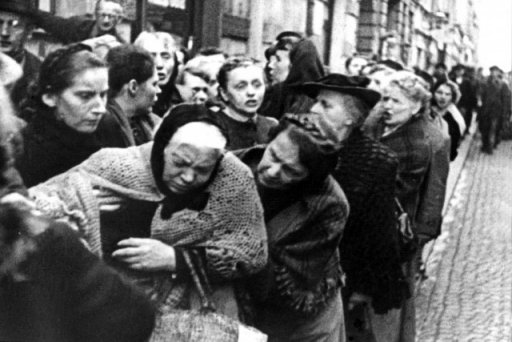 An older woman collapses waiting in a food line in Frankfurt-am-Main, 1916
An older woman collapses waiting in a food line in Frankfurt-am-Main, 1916
Germany's Starvation During the Armistice
Well, the Allies didn't want to "think of that" or be reminded of any moral obligations that in the past would certainly have been expected of them. They were not at all sympathetic to Ulrich von Brockdorff-Rantzau's reply. US President Wilson further salt to the wounds by accusing the Germans of "being a stupid people" who "always do the wrong thing" a sentiment that General George S. Patton 30 years later would have strongly opposed. Yet Brockdorff-Rantzau was right - hundreds of thousands of civilians were needlessly being starved to death and there was no moral justification for such a tragedy in the absence of hostilities. That such things have happened in our own day, as for example in Iraq and Korea, with millions having perished from malnutrition because of embargos, is hardly surprising given the immoral precedent set by the Allies in 1919. Such is one of the evil fruits of the ongoing loss of Christian morality in the West.
Rise of the New World Order
The Treaty of Versailles was unlike any previous treaty in the history of humankind because of its shere length and detail with 447 sections. This cumbersome document was not only the fruit of all the compromising and infighting between the four Powers who had prepared it but an extension of the 'total war' mindset. It was also the first stage of something more sinister dressed up to look progressive - it was the beginning of a 'New World Order' which has been unfolding ever since. This was arguably the very first 'globalist' document and whilst globalism in 1919 was in its relative infancy, this was the first time that it really put its head above ground. That is not to say that there weren't good things about it, like the concept of International Law, but then evil always rides on the back of good whenever it can in order to undeservedly share in its credit by association. A century later - today - it the globalist 'New World Order' has virtually attained its dream of a One World Government run by unelected corporations. And though we may be tempted to lay all the blame for the mess of our modern world at the feet of France, the UK, USA and Italy, in reality these nations - its peoples - were but the instruments of a hidden banking and military-industrial fraternity conjoined by a shared satanic belief system known for their manipulation of economies and their pursuit of war for personal wealth and power.

The League of Nations and Globalism
The brainchild of this deep state cabal was the League of Nations, the precursor to the brazenly communistic and totalitarian United Nations formed under almost identical cirumstances in the aftermath of the Second World War. Remember that communism was first birthed during the First World War and has expanded and mutated, merging with corporate capitalism into a strange and very dangerous hybrid indeed of which modern China is the model and sign of things to come planet-wise. Ostensibly created to prevent future wars, the League of Nations and its successor were in reality envisioned as being the nucleus of a future totalitarian communistic World Government. To achieve this, Christianity had to first be eroded and then snuffed out of its heartland in Europe and then in the worldwide European diaspora. In today's world, the USA is the last resistance which is why the battle is being fought so viciously in that land today.

Territorial and Material Losses - Terms of the Treaty
The Treaty of Versailles forced Germany to yield 13 per cent of its territory, most of which was from Prussia (West Prussia, Danzig, Posen, Upper Silesia, Memelland, northern Schleswig, the Saarland and Eupen-Malmedy), itself now a republican 'Free State' stripped of its Hohenzollern rulers who represented Christian family values. Along with the territory went 10 per cent of its population - 1 in every 10 people. Germany's oversees colonies were split up between Britain, France, Belgium and Japan. Finally, the country was effectively disarmed, its Army reduced to 100,000 men and its Navy to 15,000, and all tanks, submarines, aircraft and large warships were banned. The entire German High Seas Fleet, which had been the cause of rivalry between Britain and Germany and the first place, was given to the Allies.
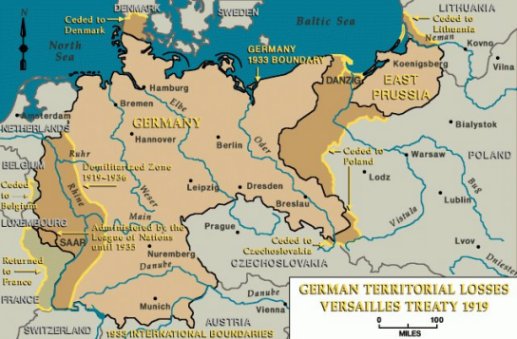
Occupation of the Rhineland
The Rhineland, long coveted by France as a colonial possession as it had once been under the tyrant Napoleon, was to be demilitarised and occupied by the Allies for a very long period of time. (In those days Britain and Prussia had been on the same side and, together with Russia, the three had brought an end to Napoleon's reign of terror). Indeed, France had desperately fought to have the German Rhineland detached from Germany and made into a separate country in 1919 but were opposed by the British and Americans. The Rhineland would remain under occupation for 17 years until 1936 when Germany seized it back unopposed.
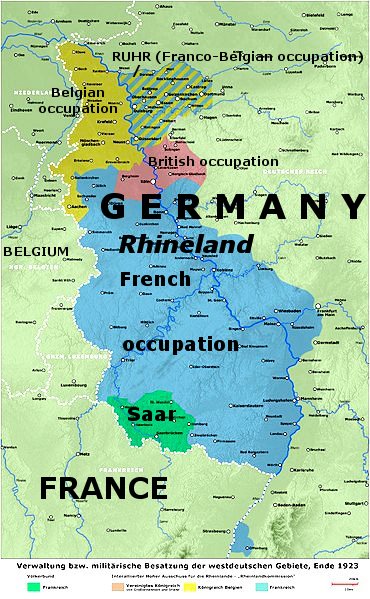
Reparations and War Guilt
Finally, Germany would have to pay huge reparations in cash (billions of Marks to compensate the Allies for war damages) and in materials, the latter including German's merchant fleet, 40 million tons of coal and half of the nation's chemical stocks, and much else besides. Most humiliating of all, and a blatant untruth, was the 'War Guilt Clause', Article 231, in which Germany was blamed for the war in its totality. Finally, Germany would not be allowed to join the League of Nations until given permission to do so by the victorious Allies.
 The rape and humiliation of Germany as the implementation of
The rape and humiliation of Germany as the implementation of
the Treaty of Versailles came to be viewed by the Germans
A Failure to Deliver Enough Referendums
The revelation of the contents of the Treaty came not just as a shock to the Germans but to many on the Allied side also who viewed the whole or parts of the document as being wholly unreasonable. In Germany itself, from the Left to the Right and everywhere inbetween, nearly everyone was understandably unhappy with, or outraged by, the Treaty. Millions of Germans, who would find themselves the citizens of new countries following the separation of their territories, demanded referendums as had been promised by US President Wilson whose word the Germans has unquestioningly accepted. In the end, only three were delivered - in East Prussia, Schleswig and Upper Silesia. Horrified that the overwhelmingly Slavic Masurenland had voted 97 per cent for Germany and only 3 per cent for Poland in the first of these in East Prussia, showing that shared culture counted more than racial origin, the Allies dishonestly manipulated the other two plebiscites. In Upper Silesia, they detached obviously German areas from the referendum (Falkenberg, Neiße, Neustadt) as the vote here would have negatively impacted the pro-Polish vote and then when Germany won it, partitioned the Province, awarding most of the coal mines to Poland. Realising their 'mistake' in Upper Silesia, the Allies decided to partition Schleswig in advance by creating two voting districts to ensure the outcome they wanted. The goal, after all, was not self-determination but to punish Germany, at least from the French side.
Had the Allies Been Men of Their Word...
From my own exhaustive studies made in the 1970's when I was writing my book, An Historical Atlas of Modern Europe: 1871-1978, I have no doubt that, with the exception of the Province of Posen, all the subsequently detatched territories would have voted to remain in Germany, from the Memelland (illegally seized by Lithuania) to Elsaß-Lothringen or Alsace-Lorraine which was so highly coveted by France even though its population was largely German! The German inhabitants of nearly all these detached territories, with the exception of those living in Danish-controlled north Schleswig and possibly Belgian-controlled Eupen-Malmedy, were greatly oppressed by their new masters, culminating in the 'Bromberg Massacre' or 'Bloody Sunday' in Poland between the 3 and 4 September 1939.
The Wish to Erase Germany
The Germans had underestimated the hurt and hate that still lingered in Paris and did not expect the terms that had been thrust upon them, terms which they rightly viewed as a betrayal of the Armistice Agreement and a death sentence for Germany. Brockdorff-Rantzau, Germany's Foreign Minister and Chief Negociator, was aghast and summarised the Treaty with these sobering words:
"This fat volume was quite unnecessary. They could have expressed the whole thing more simply in one clause: 'L'Allemagne renonce à son existence - Germany renounces its existence.'"
The German People Respond
And no doubt not a few Frenchmen would have wished the whole of Germany to have been erased from the map and to return to what it was before the unification of 1871 when it was a collection of hundreds of small states posing no threat to French economic hegemony. Demonstrations broke out spontaneously across the whole of Germany. One German newspaper wrote that the Treaty was:
"...a document of the oldest type of subjugation politics, far removed from the ideas of the League of Nations, without the least hint of a new spirit, substituting force for justice....Where are all the flowery speeches and justice? Where are Wilson's points, which we and the enemy recognised as the basis for an armistice? Was everything just a trick? Is there no justice, no trust anymore?"
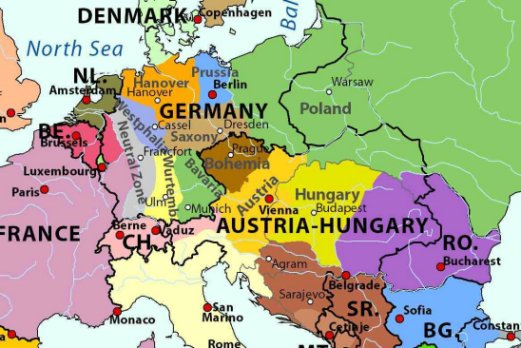 A French partition plan made in 1915: Germany would be reduced to 6 small states - Prussia, Saxony, Hanover, Westfalia, Württemberg and Bavaria, the Rhineland would be partitioned between Belgium and France, the whole of Schleswig-Holstain would go to Denmark, and everything east of the Oder-Neiße line would go to Russia. A similar fate awaited Austria-Hungary
A French partition plan made in 1915: Germany would be reduced to 6 small states - Prussia, Saxony, Hanover, Westfalia, Württemberg and Bavaria, the Rhineland would be partitioned between Belgium and France, the whole of Schleswig-Holstain would go to Denmark, and everything east of the Oder-Neiße line would go to Russia. A similar fate awaited Austria-Hungary
The Scheidemann Speech
Yes, it was a trick. No, there was no justice. We can be sure of that. Even the liberals and socialists were outraged. The Social Democratic Chancellor, Philipp Scheidemann, gave an impassioned speech saying:
"...German tribes...We belong together!...We are one flesh and one blood, and whomsoever tries to separate us cuts into the living body of the German nation with a murderous knife...Today we must save the life, the naked and poor life, of our country and people, as everyone feels a strangling hand on his throat" (Philipp Scheidemann, Gegen die Annaahme des Versailler Vertragen 12 May 1919, p.254.
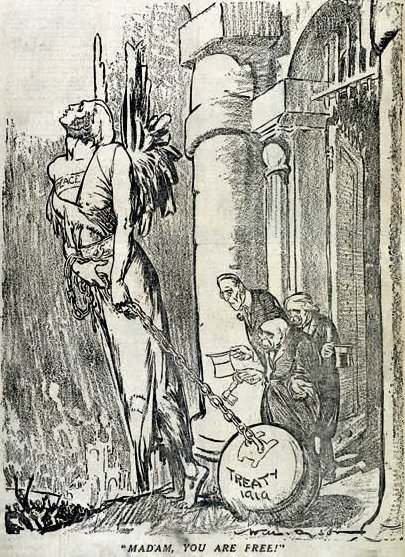
The Allies Werre Not All Agreed
As I said, even some of the Allies, seeing the terms of the Treaty for the first time, were appalled. South African General and politician Jan Smuts, reacted saying:
"There will be terrible disappointment when the peoples realise that we have not made a Wilsonian peace, that we have not kept our promises to the world and not kept faith with the public" (Margaret MacMillan, The Peacemakers: Six Months That Changed the World, p.475).
The German Dilemma
Some members of the American delegation were so disgusted with the terms that they resigned as did the British economist George Maynard Keynes a few weeks later. But it made no difference because the French were determined to have their revenge. The Germans were in a dilemma: if they refused to sign the Treaty, the Allies might invade them or the country might break up into multiple states, or both. Brockdorff-Rantzau was limited in what he could do in Paris so he concentrated on mobilising public opinion outside Germany against the Treaty by appealing to the international Left. With sufficient pressure from their own publics, he hoped that the Allied governments might agree to negociate directly with him. Failing that, he favoured rejecting the Treaty, along with Chancellor Scheidemann. Unfortunately, influential Germans like Matthias Erzberger, who was the Finance Minister, who had signed the Armistice the previous November, feared the consequences of refusal more than the terms of the Treaty and urged acceptance.
A Counter-Proposal from Berlin
And so on 29 May, after days of heated debate in Berlin, the German answer was finally given with the following proposal:
- 1. Retain the 1914 borders except where people voted to leave with a two-thirds majority - they figured this would result in the loss of Elsaß-Lothringen (Alsace-Lorraine), Schleswig and Posen;
- 2. Disarm, and pay a one lump-sum reparation;
- 3. Join the Leage of Nations immediately;
- 4. The occupation of the Rhineland would be limited to 6 months rather than 15 years; and finally
- 5. Germany would reject responsibility for the war and put the blame on Russia, since they had been agitating the Serbs to rise up against Austria-Hungary which had led to the assassination that had started the war.
Wrong Timing
Though this was an honourable solution and more in line with Wilson's principles, the timing was wrong. Had there been more time - a few years at least, to allow anger and hostility to subside on the French side, there might have been a possibility for negociation. But the French implaccably wanted revenge and they wanted it immediately. Brockdorff-Rantzau had moral rectitude on his side but little else. Since no opening was granted for the necessary face-to-face negociation through human contact to be made to enable moral rectitude to have its say, there was no possibility of any compromises being reached in the traditional way as between diplomats. Everything was just too emotionally charged, fueled by years of war, suffering, propaganda, and death on an horrific scale. Brockdorff-Rantzau was, I regret, naïve and in an impossible situation. He hoped prolonging the negociations a couple of months would enable a softening of hearts. In reality, human nature being what it is, 20 years would have been more realisic, to allow a new generation to arise but by then a Second World War was ready to break out.
Preparations for an Invasion of Germany
The Allies were in no mood for any sort of compromise - from their point of view, after 5 years of horrific war and months of negociations between themselves, too much work had gone into the Treaty and they were indisposed to alter it. Indeed, before the Germans had even given their answer, the Supreme Allied Commander, Marshal Foch, was already drawing up plans for a full scale invasion of Germany in the event of the Germans not signing. Only the British were not only prepared to accept Treaty modifications but the British prime Minister, Lloyd George, was prepared to withdraw support for the Treaty if nothing was done. This enraged President Wilson. In the end, the only changes that were made were to grant a plebiscite in Upper Silesia, which as we saw was to be manipulated in Poland's favour, and to make Germany's future admission to the Leage of Nations slightly less difficult.
Rubbing Salt in the Wound
The Allies sent a harsh response, underscoring Germany's guilt even more, together with an Ultimatum, on 16 June. The modified Treaty demonised Germany even further, saying:
"The war which broke out on August 1st 1914 is the greatest crime against humanity and against the freedom of nations ever committed by a nation that calls itself civilized. The behaviour of Germany is nearly unparalleled in human history. The terrible responsibility that burdens her...that at least seven million dead lie buried in Europe, while more than 20 million of the living bear witness through their wounds and suffering to Germany's desire to quench its thirst for tyranny through war" (Jörn, op.cit., p.1010).
Accept Unconditionally or Be Invaded!
The Ultimatum was, essentially: accept the terms or be invaded! With the prospect of an invasion, Berlin was plunged into a crisis. Nevertheless Brockdorff-Rantzau and the Peace Delegation wanted to refuse the terms and wrote to Berlin:
"The conditions of peace are still unbearable, for Germany cannot accept them and continue to live with honour as a nation" (Eric Hobsbawm, Age of Extremes: The Short Twentieth Century 1914-1991, p.31.
Christianity at Stake
And they were, of course, absolutely right. The bloody-mindedness and singular absence of Christian charity from the Allies' side not only hardened the Germans' subsequent resolve for revenge, itself obviously a mistake, encouraging the rise of Nazism, but also served further to quench even more Christianity out of the public sphere. This was a field day for the devil. Forgiveness, compromise and charity might have not only have prevented another World War but slowed down the erosion of Christianity on in the Western and Central parts of the continent too - it was already in full retreat in the east with the rise of the Soviet Union. But you have to remember that France was already heavily influenced by socialistic ideas and the Gospel has never been really successful in that nominally Catholic but now wholly secularised and increasingly Islamised land.
To Fight or Not to Fight?
In Germany, most generals wanted to fight, except for General Grüner who did not feel the civilians could manage any further deprivation. Scheidemann still did not want to sign but Erzberger, the pragmatist, realised that failure to sign could result in a full-scale Bolshevik revolution or Allied invasion, or both, when what an exhausted and bleeding Germany most needed was stability. The deadlocked government resigned, along with Foreign Minister Brockdorff-Rantzau, who blamed Finance Minister Erzberger for betraying the country and "ruining everything". But if Brockdorff-Rantzau thought he could have achieved anything, he was naïve to say the least.
A New German Government Caves In
The High Seas Fleet, inturned at Scapa Flow in Scotland, did the only honourable thing and scuttled all its ships. Meanwhile a new government under Gustav Bauer was formed in Berlin which informed the Allies it would accept the terms except for the 'War Guilt Clause' and the proviso for war crimes trials. Again, the Allies refused, and gave the Germans 24 hours to fully accept. Realising there was no choice, Bauer yielded just hours before the Armistice would have ended and hostilities would have resumed. And that, ladies and gentlemen, was how the Treaty of Versailles came to be signed and put into effect, and why Europe and the world looks the way it does today.
Theatre and Humiliation
The Treaty of Versailles was signed on 28 June 1919, 100 years to the day, in the Hall of Mirrors in the Palace of Versailles where the German Empire or Second Reich was created in 1871 following the end of the Franco-Prussian war. President Wilson's adviser, Edward M.House, admitted:
"The whole affair was elaborately staged and made as humiliating to the enemy as it well could be" (Garwarth, op.cit., p.199).
A Poisonous Spirit of Revenge
Gone was the sober and rational diplomatic culture of the past. Foreign Minister Herman Müller and Transport Minister Johannes Bell signed for Germany at 5 am. It came into effect 6 hours later at 11 am. Some on the British and American sides felt the Treaty was too harsh and that it spelled trouble for the future. They were right. Jan Smuts of South Africa wrote to President Wilson to makie his protest:
"This treaty breathes a poisonous spirit of revenge, which may yet scorch the fair face - not of a corner of Europe, but of Europe" (Alan Sharp, The Versailles Settlement: Peacemaking After the First World War, 1919-1923, p.204.
Foch Prophesies
And yet - unbelievably - Ferdinand Foch, the French Supreme Commander, complained that the Treaty was too weak. But he was right in one prediction he made at least:
"This is not Peace. It is an armistice for 20 years" (Sharp, op.cit., p.200).
A Dishonourable Peace and a Second World War
How did he know? A lucky guess? 20 years and 2 months later the Second World War broke out. France was crushed and humiliated, Germany taking her revenge. And by the time that war was over, and millions more were dead. Gustav Bauer, responsible for surrendering to the Allies, had spoken wisely:
"I will believe to my last breath that this attempt at dishonouring us will one day dishonour its creators, and that in this global tragedy it is not our honour that has been taken, but theirs" (Jörn, op.cit., p.1017).
The 21st Century World
Hitler chose revenge too and destroyed Germany's honour. Now, perhaps, all European countries - and the United States and other Allies, some of whom bcame Enemies in the second great conflagration (Italy, Romania and Japan) - have lost their honour. We live in a post-Christian Western world, where honour is consumed by lies, treachery, murder and immorality. New Empires have arisen as America and Euerope face off with China and Russia. In Germany - what's left of it - traitors have served its Enemies in the East and kow-towed to the Deep State in the West. Germany today isn't even an independent country but a Corporation owned by deep state interests in the USA, UK and France. The former Allies abolished Prussia and then a Higher Power abolished the Soviet Union. That same Higher Power is, alas, about to abolish all the rest, for the wicked cabal that promoted and fuelled the two world wars of the past are now determined to fuel yet another one - a Third World War - and by this means, and by other processes also working right now, abolish forever Christian civilization and the nations that created and nurtured it. But they cannot succeed. The Creator of this Universe will have the last word.
When Europe and the West Was at Its Greatest
A hundred years have passed, what more is there to be said? What more can be said? Europe arguably reached its pinnacle, at least in Germany and Great Britain, in the first decade of the 20th century. Our going to war with each other was the biggest mistake in modern history. We were natural allies who defeated that foul spirit that birthed the French Revolution that spread to Moscow and Peking and which now is coming to term in Brussels and Washington DC. Today Britain faces its own Treaty of Versailles, the Brexit Treaty. What will come to America? And the land of Jan Smut? Something like it, I dare say.
Conclusion
It remains only for me to say one last thing. On behalf of my country of Great Britain, I wish to repent to the German nation and to ask forgiveness, for our part in the Treaty of Versailles. I hope that representatives of the other Allied nations will do the same. Germany has for sure paid heavy reparations for both world wars, but now there must be forgiveness and reconciliation, else we cannot call ourselves Christians. I doubt we will see justice done in our lifetimes but I do believe it will be done one day and everything will be put right.
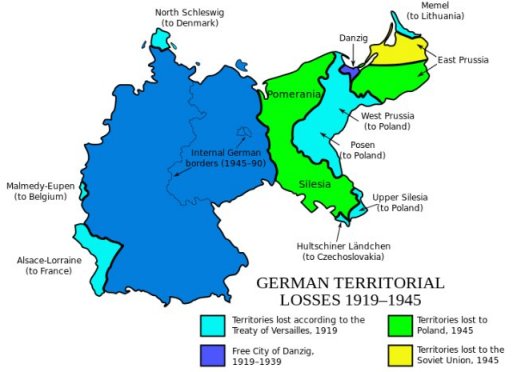
Created 28.06.2019 | 28.06.2019
Copyright © 2019 SBSK Preussens Gloria
Alle Recht vorbehalten - All Rights Reserved


